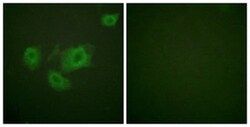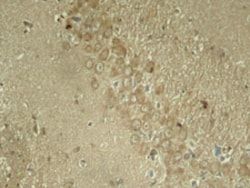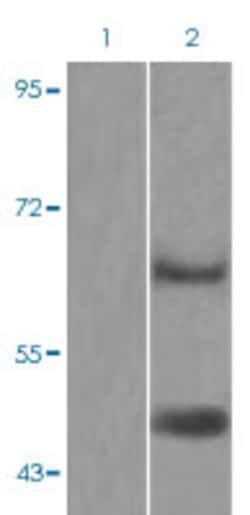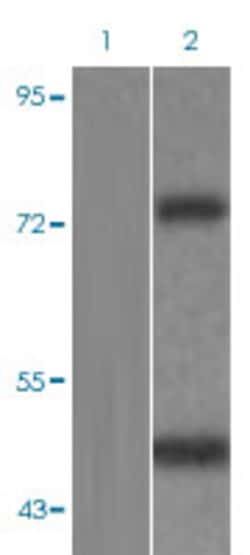KCNJ11 (phospho T224) Rabbit anti-Human, Mouse, Polyclonal , Abnova™
Manufacturer: Abnova Corporation
Select a Size
| Pack Size | SKU | Availability | Price |
|---|---|---|---|
| Each of 1 | 89-956-759-Each-of-1 | In Stock | ₹ 55,803.00 |
89-956-759 - Each of 1
In Stock
Quantity
1
Base Price: ₹ 55,803.00
GST (18%): ₹ 10,044.54
Total Price: ₹ 65,847.54
Antigen
KCNJ11 (phospho T224)
Classification
Polyclonal
Description
Rabbit polyclonal antibody raised against synthetic phosphopeptide of human KCNJ11.
Formulation
In PBS (without Mg2+and Ca2+), 150 mM NaCl, pH 7.4 (50% glycerol, 0.02% sodium azide)
Gene Symbols
KCNJ11
Immunogen
Synthetic phosphopeptide (conjugated with KLH) corresponding to residues surrounding T224 of human KCNJ11.
Quantity
100 μL
Primary or Secondary
Primary
Test Specificity
KCNJ11 (phospho T224) polyclonal antibody detects endogenous levels of human KCNJ11 only when phosphorylated at threonine 224.
Content And Storage
Store at -20°C.Aliquot to avoid repeated freezing and thawing.
Applications
Immunofluorescence, Western Blot
Conjugate
Unconjugated
Dilution
Immunofluorescence (1:100-1:500) Western Blot (1:500-1:3000) The optimal working dilution should be determined by the end user.
Gene Alias
BIR/HHF2/IKATP/KIR6.2/MGC133230/PHHI/TNDM3
Host Species
Rabbit
Purification Method
Affinity chromatography
Regulatory Status
RUO
Gene ID (Entrez)
3767
Target Species
Human, Mouse
Form
Liquid
Description
- Potassium channels are present in most mammalian cells, where they participate in a wide range of physiologic responses
- The protein encoded by this gene is an integral membrane protein and inward-rectifier type potassium channel
- The encoded protein, which has a greater tendency to allow potassium to flow into a cell rather than out of a cell, is controlled by G-proteins and is found associated with the sulfonylurea receptor SUR
- Mutations in this gene are a cause of familial persistent hyperinsulinemic hypoglycemia of infancy (PHHI), an autosomal recessive disorder characterized by unregulated insulin secretion
- Defects in this gene may also contribute to autosomal dominant non-insulin-dependent diabetes mellitus type II (NIDDM), transient neonatal diabetes mellitus type 3 (TNDM3), and permanent neonatal diabetes mellitus (PNDM)
- [provided by RefSeq]



